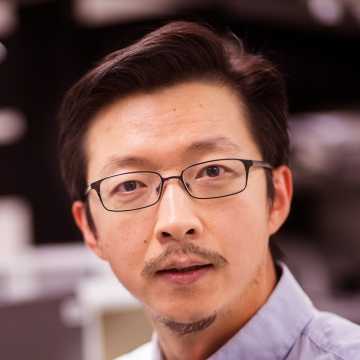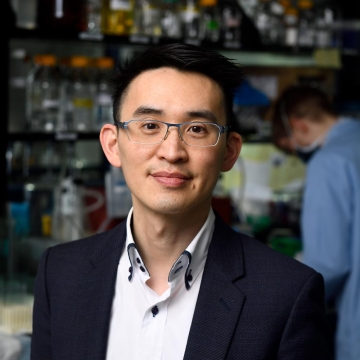Master of Science (ScM)
Offered By: Department of Biochemistry and Molecular Biology
Onsite | Full-Time | 2 years
About the ScM in Biochemistry and Molecular Biology Program
The Master of Science (ScM) is a two-year program that is perfect for students who wish to obtain a blend of coursework with rigorous training in laboratory research.
During the ScM, students will learn some of the newest techniques for cell, molecular, and biochemistry research. Typically, ScM graduates continue their training in healthcare or advanced graduate research study or obtain positions in industry or government.
The ScM combines the coursework of the 9-month Biochemistry and Molecular Biology Master of Health Science (MHS) degree with an additional year of lab research training that culminates in an original research-based thesis under the guidance of a faculty mentor. MHS students may apply to transfer to ScM.
ScM in Biochemistry and Molecular Biology Program Highlights
The Biochemistry and Molecular Biology ScM was created for students who wish to obtain a combination of coursework with in-depth training in laboratory research. Joining our program provides you with:
- Hands-on experience in laboratory research under the guidance of a faculty mentor, including in a year of independent, original research culminating in a ScM thesis
- A strong grounding in basic biology and public health topics through a curriculum that combines core courses in the Biochemistry and Molecular Biology Department with electives that can be taken throughout the School of Public Health
- Training to communicate research findings, including opportunities to give presentations at School of Public Health venues or at national meetings and publish in peer-reviewed journals
- Access to the School of Public Health Career Services Office, offering excellent career services and professional development for careers paths from medicine to biotech to academia and beyond
- Opportunities to participate in community service, engagement, and outreach, both within the Bloomberg School, and beyond, with a focus on our East Baltimore neighborhoods, through SOURCE
1st
Year follows MHS-based coursework structure plus research rotations
1+
year of laboratory research experience
75%
Tuition remission for the second year through the Master's Tuition Scholarship
1 on 1
Mentorship by laboratory faculty lead
What Can You Do With an ScM In Biochemistry And Molecular Biology?
Typically, ScM graduates continue their training in healthcare or advanced graduate research study or obtain positions in industry or government.
Sample Careers
- Clinical Researcher
- Physician Scientist
- Biology Professor
- Lab Tech
- Research Scientist
- Industry Biotechnologist
- Science Policy Analyst/Advocate
- Science Writer/Journalist
- Research Consultant
Preparation For
- PhD Programs
- Medical School
Curriculum for the ScM in Biochemistry and Molecular Biology
The ScM has the same course requirements of the Master of Health Science (MHS) degree, with an additional year of lab research training.
Browse an overview of the requirements for this master's program in the JHU Academic Catalogue and explore all course offerings in the Bloomberg School Course Directory.
18.5
Core course credits
36
Minimum elective course credits
57+
Lab research credits
100+
Available courses across BSPH
Admissions Requirements
For the general admissions requirements see our How to Apply page. The specific program also requires:
Prior Work Experience
Laboratory research experience (from academia, industry, etc.) is required
Prior Coursework
Strong background in the sciences, particularly in chemistry, biochemistry, or biology
Standardized Test Scores
Standardized test scores (GRE, MCAT) are optional for this program. The admissions committee will make no assumptions if a standardized test score is omitted from an application, but will require evidence of quantitative/analytical ability through other application components such as academic transcripts and/or supplemental questions. Applications will be reviewed holistically based on all application components.
Program Faculty Spotlight

Jiou Wang, MD, PhD, seeks to understand what controls the birth and death of a protein and how the shape and function of DNA and RNA are connected in health and diseases.

Anthony K. L. Leung, PhD, MBioch, is a molecular biologist who studies how cellular regulation of RNA impacts cancer, neurodegeneration, and virus infection.

Ashi Weeraratna, PhD, studies how cancer cells move to distant sites and how changes in the normal cells around a tumor contribute to their movement, especially as we age.

Roza Selimyan, PhD, leads the Biochemistry and Molecular Biology Department academic programs, where she focuses on connecting science, health, and education.
Tuition and Funding
The Master’s Tuition Scholarship is available to students in good academic standing in a two-year, full-time master’s program. In total, it provides a 75% reduction in tuition for the second year. Students have the option of distributing the scholarship entirely in their second year of study or receive a 25% reduction in tuition their first year and 50% in their second year. Furthermore, during the second year ScM students receive a financial stipend for their technical contributions in their host lab ($15 per hour, 19 hours per week).
Contact Us
Questions about the program? We're happy to help.
Roza Selimyan, PhD
BMB Executive Director for
Academic Affairs and Education Programs
Erika Vaitekunas
Administrative Specialist
Compare Programs
- Check out similar programs at the Bloomberg School to find the best fit.
- Master of Health Science (MHS), Offered by BMB
- Doctor of Philsophy (PhD), Offered by BMB
- Master of Health Science (MHS), Offered by MMI
- Doctor of Philosophy (PhD), Offered by MMI
- Master of Health Science (MHS) in Environmental Health
- Doctor of Philosophy (PhD) in Environmental Health
